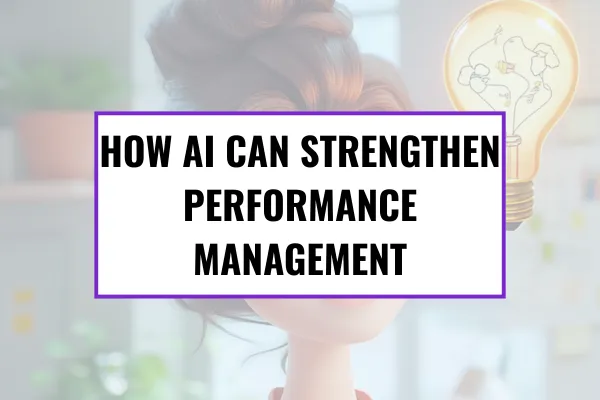
How AI can strengthen performance management
How AI Can Strengthen, Not Strip, the Human from Performance Management
Key Takeaways
AI in human resources augments, not replaces, the human touch - especially in performance management.
HR professionals can use AI to remove bias, enhance the quality of feedback given to employees, and support fairness in employee reviews.
Human oversight remains essential: AI provides insights, but people provide empathy, context, and leadership.
The future of performance management is hybrid with a blended, data-driven support element linked with human-centred conversations.
The Question on Many HR Directors’ Minds
“What if AI takes the human out of performance management?”
It’s a fair concern and one that should be carefully considered.
Performance management is one of the most sensitive, people-focused areas of HR but can often be seen as a tick box exercise. The thought of algorithms, dashboards, and automated nudges replacing meaningful dialogue can feel cold, even counterproductive. And rightly so.
But the reality is this: AI, when implemented thoughtfully, is most definitely not about replacing the human touch. It’s about enhancing it and that can be done in so many different ways.
Why HR Teams Feel Nervous About AI in Performance Management
AI has gained traction in recruitment, learning and development, and employee engagement. Yet, performance management feels different. At its core, it relies on:
Trust and the relationship between manager and employee
Nuanced judgement around performance outcomes
The ability to inspire, coach, and motivate
The fear is that AI could reduce these conversations to numbers, strip nuance, and create an even bigger “tick-box” culture.
How AI Enhances Human-Led Performance Management
1. Reducing Bias and Improving Fairness
AI can analyse performance data at scale, flagging inconsistencies in manager ratings or patterns of unconscious bias. This doesn’t strip out the human element; it gives HR and leaders better visibility so they can address inequities with empathy.
2. Providing Richer Feedback Data
Instead of relying solely on annual reviews, AI-powered platforms can gather continuous performance signals - project outcomes, peer feedback, learning activity. Managers then walk into review conversations better informed, making discussions more balanced and constructive.
3. Freeing Time for Human Conversation
Automating the admin of collating, tracking, and documenting performance frees HR and managers to focus on what matters most: the coaching, recognition, and career development conversations that can’t be automated.
4. Supporting Manager Capability
AI can act as a “copilot” for managers - suggesting coaching prompts, highlighting development opportunities, or nudging managers when it’s time for a check-in. For less experienced leaders, this support can be invaluable.
The Human Element Remains Irreplaceable
AI is a tool. It cannot replicate empathy, contextual understanding, or the motivational power of a well-delivered conversation, no matter how good you become at writing prompts, or using various AI tools.
The HR professional's role is not to resist AI, but to ensure implementation keeps people at the centre and at its core is ethical.
This means:
Transparent communication about how AI is used
Ethical data governance to build trust
Clear guidance and assurances that human judgement will always prevail
A Hybrid Future: People + AI in Performance Management
The future is not AI versus humans, but AI with humans. Imagine a performance review where:
AI has collated a fair, bias-checked, data-rich view of performance.
The manager has more time and confidence to coach, mentor, and inspire.
The employee feels heard, understood, and supported in their career.
That’s not stripping out humanity. That’s strengthening it.
Frequently asked questions:
Will AI replace managers in performance management?
No. AI supports managers by providing data and insights, but the conversations and decisions require human empathy and judgement.
Can AI make performance reviews more objective?
Yes. AI can highlight bias, inconsistencies, and trends, helping HR create fairer processes. But final outcomes should always involve human review.
What’s the biggest risk of using AI in performance management?
Over-automation. If organisations rely too heavily on AI without human oversight, employees may feel dehumanised. Balance is key.
How should HR Directors start with AI in performance management?
Begin small. For example, use AI to flag review inconsistencies, bias or provide automated manager nudges. Build confidence gradually, with transparency and employee communication at the core.

